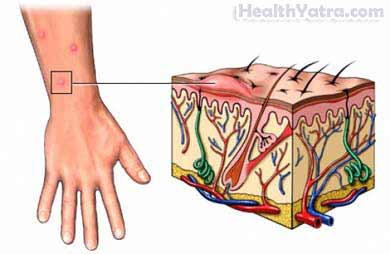परिभाषा
Allergies are abnormal or adverse reactions to a substance. Insect allergies are a reaction to insect stings or bites. It can also occur with exposure to such insects in an environment.

का कारण बनता है
Stinging insects include:
- Honeybees
- Yellow jackets
- Hornets
- Wasps
- Fire ants
Biting insects include:
- Blackflies
- Fleas
- Horseflies
- Mosquitoes
- Kissing bugs
Insects that cause respiratory allergies include:
- Cockroaches
- Midges
- Lake flies
- Caddis flies
जोखिम कारक
Factors that increase your chance of insect allergies include:
- उम्र: छोटे बच्चे
- परागज ज्वर सहित अन्य प्रकार की एलर्जी का इतिहास
- Family history of allergy
- Occupations that expose you to insects
- Living conditions that expose you to insects or dust-containing insect allergens
लक्षण
An allergy to biting and stinging insects can affect the area around the bite or sting and cause:
- त्वचा के लाल चकत्ते
- हीव्स
- खुजली
- सूजन
- लालपन
- Hotness
Anaphylaxis can be a life-threatening reaction that causes:
- Skin rash, hives, itching, swelling in areas away from the sting site
- Swelling of lips, tongue, face, throat, and eyelids
- Difficulty breathing, shortness of breath, coughing, wheezing
- चक्कर आना, बेहोशी आना
- रक्तचाप में गंभीर गिरावट
- Respiratory and/or cardiac arrest
Some insects cause respiratory allergies that result in:
- बहती नाक
- छींक आना
- खाँसना
- घरघराहट
- सांस लेने में दिक्क्त
- सांस लेने में कठिनाई
निदान
The doctor will ask about your symptoms and medical history. A physical exam will be done. Most diagnoses are based on a history of a reaction after a sting. For those with a severe insect allergy, stings may be life-threatening. Therefore, it is important to see an allergist or immunologist (doctor who specializes in allergies).
Tests include:
- Skin prick test—An extract of the insect’s venom or protein is diluted. The dilute is placed on your forearm or back skin. If there is swelling or redness, an allergic reaction may be present. The doctor will make the diagnosis based on the skin test and your history of symptoms. Some skin tests can have a severe allergic reaction. This test should only be used under the supervision of a physician or other trained medical personnel. Severe eczema may make this test hard to interpret.
- RAST or ELISA test—The doctor may order blood tests (RAST or ELISA). These tests measure the level of insect-specific IgE in the blood. IgE is a type of protein that the body produces when it is exposed to something to which it is allergic. The presence of IgE in the blood may indicate an allergy.
उपचार
Some reactions cause trouble breathing. In this case, call for emergency medical help.
उपचार में शामिल हो सकते हैं:
- Epinephrine—injected immediately in the event of a severe, life-threatening insect sting allergy (anaphylaxis)
- Antihistamine medications—to decrease swelling and itching
- Ice—applied to local area of sting or bite to decrease swelling
- Corticosteroid medications—for more severe swelling, itching, nasal congestion, and sneezing
- Bronchodilators—inhalers that can be used to decrease asthma-like symptoms, such as wheezing, coughing, and shortness of breath
- Venom immunotherapy—a series of allergy shots to gradually desensitize you to insect stings; usually for honeybees, yellow jackets, hornets, wasps, or fire ants
If you are diagnosed with a reaction to an insect bite or sting, follow your doctor’s instructions.
रोकथाम
To reduce your chance of having an allergic reaction to either biting or stinging insects:
- Avoid stinging insects.
- Be very careful when doing yard or garden work. Beware when hiking in the forest.
- Don’t walk barefoot.
- Don’t wear scented products. Perfumes can attract stinging insects.
- Keep exposed skin to a minimum.
- Consider immunotherapy (allergy shots). These can lessen your reaction to stinging insects
- Carry self-injectable epinephrine and possibly Benadryl for severe reactions.
- Wear a medical alert bracelet or necklace. These will inform others of your allergy.
To reduce your chance of having an allergic reaction to insects that provoke respiratory responses:
- Avoid having carpeting, curtains, or other fabric that may gather dust in your home. This is very important in the room where you sleep.
- Vacuum and wet mop your floors frequently.
- Regularly wash your linens in very hot water.
- Cover mattresses and pillows in allergy-proof covers.
